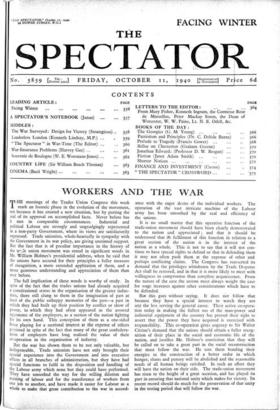WORKERS AND THE WAR
THE meetings of the Trades Union Congress this week mark an historic phase in the evolution of the movement, not because it has created a new situation, but by putting the seal of its approval on accomplished facts. Never before has it met in comparable circumstances. Industrial and political Labour are strongly and ungrudgingly represented in a non-party Government, where its views are satisfactorily expressed. Trade unionists, whole-heartedly in sympathy with the Government in its war policy, are giving unstinted support. But the fact that is of peculiar importance in the history of the trre union movement was stated in significant words in Mr. William Holmes's presidential address, when he said that the unions have secured for their principles a fuller measure of recognition, a more extended application of them, and a more generous understanding and appreciation of them than ever before. THE meetings of the Trades Union Congress this week mark an historic phase in the evolution of the movement, not because it has created a new situation, but by putting the seal of its approval on accomplished facts. Never before has it met in comparable circumstances. Industrial and political Labour are strongly and ungrudgingly represented in a non-party Government, where its views are satisfactorily expressed. Trade unionists, whole-heartedly in sympathy with the Government in its war policy, are giving unstinted support. But the fact that is of peculiar importance in the history of the trre union movement was stated in significant words in Mr. William Holmes's presidential address, when he said that the unions have secured for their principles a fuller measure of recognition, a more extended application of them, and a more generous understanding and appreciation of them than ever before.
The full implication of these words is worthy of study. In spite of the fact that the trades unions had already acquired a constitutional stitus in the organisation of the greater indus- tries, there still clung to them in the imagination of part at least of the public unhappy memories of the past—a past in which they had built up their position by conflict or show of power, in which they had often appeared as the avowed opponents of the employers, as a section of the nation fighting for its own hand. This conception of them as a one-sided force playing for a sectional interest at the expense of others persisted in spite of the fact that many of the great confedera- tions of employers have long realised the value of their co-operation in the organisation of industry.
But the war has shown them to be not only valuable, but indispensable. Trade unionists have not only brought their special experience into the Government and into executive offices in all branches of administration, but they have had special functions to fulfil in the disposition and handling of the Labour army which none but they could have performed. They have smoothed the way for the willing dilution and training of labour and for the transference of workers from One job to another, and have made it easier for Labour as a whole to make that great contribution to the war in accord- ance with the eager desire of the individual workers. The operation of the vast intricate machine of the Labour army has been smoothed by the zeal and efficiency of the unions.
It is no small matter that this operative function of the trade-union movement should have been clearly demonstrated to the nation and appreciated ; and that it should be understood that is fulfilment of this function in relation to a great section of the nation is in the interest of the nation as a whole. This is not to say that it will not con- tinue to have special rights to defend or that in defending them it may not often push them at the expense of other and perhaps conflicting claims. The Congress has reasserted its demand that the privileges withdrawn by the Trade Disputes Act shall be restored, and in that it is more likely to meet with willingness to compromise than complete acquiescence. From the nature of the case the unions must always weight the case for wage increases against other considerations which have to be defended.
But this goes without saying. It does not follow that because they have a special interest to watch they are any the less serving the general cause. Their active co-opera- tion today in making the fullest use of the man-power and industrial equipment of the country has proved their right to assert that the power they have acquired is exercised with responsibility. This co-operation gives cogency to Sir Walter Citrine's demand that the unions should obtain a fuller recog- nition of their place in the social and economic life of the nation, and justifies Mr. Holmes's conviction that they will be called on to take a great part in the social reconstruction that must follow the war. He sees them bending their energies to the construction of a better order in which hunger, slums and penury will be abolished and the reasonable needs of all human beings satisfied. In such an effort they will have the nation on their side. The trade-union movement has risen to the height of a great occasion, and has played its part in ensuring that national unity which makes for victory. Its recent record should do much for the preservation of that unity in the testing period that will follow the war.


























